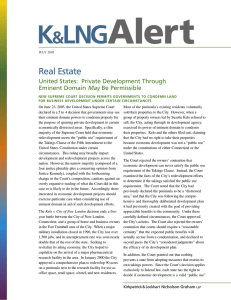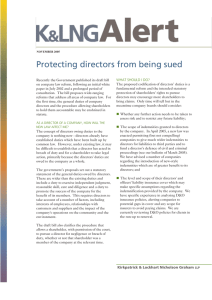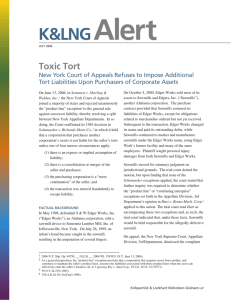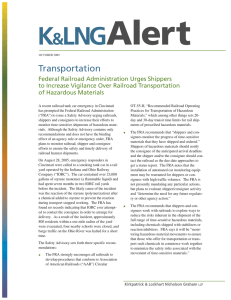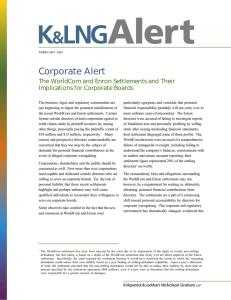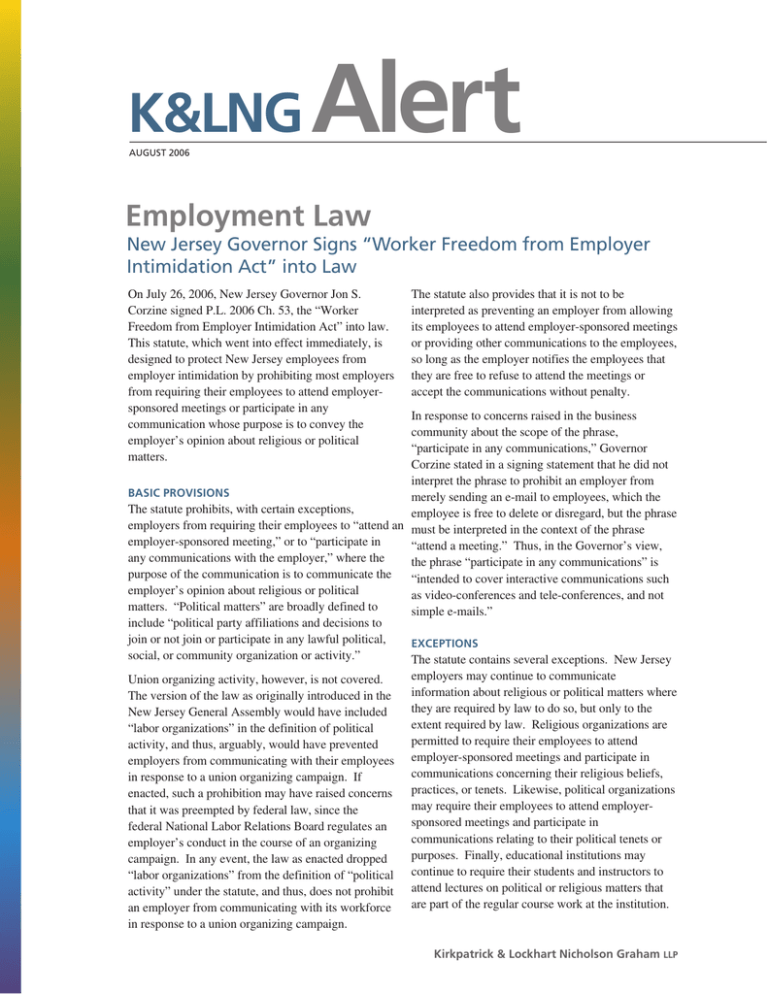
K&LNG
AUGUST 2006
Alert
Employment Law
New Jersey Governor Signs “Worker Freedom from Employer
Intimidation Act” into Law
On July 26, 2006, New Jersey Governor Jon S.
Corzine signed P.L. 2006 Ch. 53, the “Worker
Freedom from Employer Intimidation Act” into law.
This statute, which went into effect immediately, is
designed to protect New Jersey employees from
employer intimidation by prohibiting most employers
from requiring their employees to attend employersponsored meetings or participate in any
communication whose purpose is to convey the
employer’s opinion about religious or political
matters.
The statute also provides that it is not to be
interpreted as preventing an employer from allowing
its employees to attend employer-sponsored meetings
or providing other communications to the employees,
so long as the employer notifies the employees that
they are free to refuse to attend the meetings or
accept the communications without penalty.
Union organizing activity, however, is not covered.
The version of the law as originally introduced in the
New Jersey General Assembly would have included
“labor organizations” in the definition of political
activity, and thus, arguably, would have prevented
employers from communicating with their employees
in response to a union organizing campaign. If
enacted, such a prohibition may have raised concerns
that it was preempted by federal law, since the
federal National Labor Relations Board regulates an
employer’s conduct in the course of an organizing
campaign. In any event, the law as enacted dropped
“labor organizations” from the definition of “political
activity” under the statute, and thus, does not prohibit
an employer from communicating with its workforce
in response to a union organizing campaign.
employers may continue to communicate
information about religious or political matters where
they are required by law to do so, but only to the
extent required by law. Religious organizations are
permitted to require their employees to attend
employer-sponsored meetings and participate in
communications concerning their religious beliefs,
practices, or tenets. Likewise, political organizations
may require their employees to attend employersponsored meetings and participate in
communications relating to their political tenets or
purposes. Finally, educational institutions may
continue to require their students and instructors to
attend lectures on political or religious matters that
are part of the regular course work at the institution.
In response to concerns raised in the business
community about the scope of the phrase,
“participate in any communications,” Governor
Corzine stated in a signing statement that he did not
interpret the phrase to prohibit an employer from
BASIC PROVISIONS
merely sending an e-mail to employees, which the
The statute prohibits, with certain exceptions,
employee is free to delete or disregard, but the phrase
employers from requiring their employees to “attend an must be interpreted in the context of the phrase
employer-sponsored meeting,” or to “participate in
“attend a meeting.” Thus, in the Governor’s view,
any communications with the employer,” where the
the phrase “participate in any communications” is
purpose of the communication is to communicate the
“intended to cover interactive communications such
employer’s opinion about religious or political
as video-conferences and tele-conferences, and not
matters. “Political matters” are broadly defined to
simple e-mails.”
include “political party affiliations and decisions to
join or not join or participate in any lawful political,
EXCEPTIONS
social, or community organization or activity.”
The statute contains several exceptions. New Jersey
Kirkpatrick & Lockhart Nicholson Graham LLP
RETALIATION PROHIBITED
The statute also contains a broad anti-retaliation
provision that provides that a New Jersey employer
may not discharge, discipline, or otherwise penalize
an employee, or threaten to do so, because the
employee makes a good faith report of a violation or
suspected violation of the statute. The employee’s
good faith report may be oral or in writing, and the
report may come from the employee directly or
anyone acting on his or her behalf.
ENFORCEMENT
The statute provides that any aggrieved employee
may bring a civil action within 90 days after the date
of the alleged violation in a court of competent
jurisdiction. The court may award a prevailing
employee “all appropriate relief,” including, as
appropriate: (1) a restraining order against any
continuing violation; (2) reinstatement to the
employee’s former or equivalent position and
reestablishment of any employee benefits and
seniority rights; (3) the payment of lost wages,
benefits, or other remuneration; and (4) the payment
of the employee’s reasonable attorney’s fees and
costs. The court may also award the employee
punitive damages not greater than treble damages, or
an assessment of a civil fine of up to $1,000 for a first
violation and up to $5,000 for each subsequent
violation.
COMPLIANCE TIPS
The statute is new and its limits have yet to be tested
in the courts. Pending judicial interpretation, New
Jersey employers should assume that the terms
“religious or political matters” will be given broad
interpretation and will cover such matters as
employer requests for charitable contributions or
support for community, social, or religious
organizations. While employers in New Jersey may
continue to support such organizations, they should
use caution to ensure that their support is
communicated to employees in a non-coercive way.
In all cases, employer communications concerning
religious, political, social, or community matters
should include appropriate language making clear
that employees are free not to participate in such
matters or disregard the communications without
penalty.
2
New Jersey employers should also scrutinize
disciplinary and discharge decisions to reduce the
risk of violations of the new statute. Employees in
the State are protected from employer retaliation
where they complain of conduct that they suspect
violates the statute. Even erroneous complaints are
protected if made in good faith. Thus, employers
should ensure that a contemplated disciplinary or
discharge action based, for example, on
insubordination is not in reality a mask for action
taken in retaliation for an employee complaint of
conduct suspected to violate the new statute.
Counsel should be consulted when an employer is
considering disciplining or discharging an employee
who has made a recent complaint of a suspected
violation of the statute.
New Jersey employers also should be aware that they
may be subject to vicarious liability for the
unauthorized actions of their employees in violation
of the statute. To reduce or eliminate the risk of a
finding of such liability, employers should consider
implementing preventative measures, similar to those
that have been found to provide a “safe harbor” in
the anti-discrimination and anti-harassment context.
For example, New Jersey employers should consider
implementing policies that express the employers’
commitment to the new statute and prohibit coercive
communications concerning religious, political,
social or community matters in violation of the
statute. Any such policy should invite employees to
come forward and report suspected violations and
provide for a prompt investigation into reported
violations. Such a policy should also assure
employees that they will not be subject to retaliation
for reporting suspected violations. New Jersey
employers also may wish to consider requiring
managers and supervisors to attend training in the
requirements of the new statute.
Rosemary Alito
ralito@klng.com
973.848.4022
George Barbatsuly
gbarbatsuly@klng.com
973.848.4104
Kirkpatrick & Lockhart Nicholson Graham
LLP
|
AUGUST 2006
If you have questions or would like more information about K&LNG’s Employment Law Practice,
please contact one of our lawyers listed below:
Boston
Henry T. Goldman
Mark D. Pomfret
617.951.9156
617.261.3147
hgoldman@klng.com
mpomfret@klng.com
Dallas
Von E. Hays
Jaime Ramón
214.939.4959
214.939.4902
vhays@klng.com
jramon@klng.com
Harrisburg
Carleton O. Strouss
717.231.4503
cstrouss@klng.com
London
Paul Callegari
Los Angeles
+44.20.7360.8194
pcallegari@klng.com
Thomas H. Petrides
Paul W. Sweeney, Jr.
310.552.5077
310.552.5055
tpetrides@klng.com
psweeney@klng.com
Miami
April L. Boyer
Judd J. Goldberg
Carol C. Lumpkin
Michael C. Marsh
305.539.3380
305.539.3344
305.539.3323
305.539.3321
aboyer@klng.com
jgoldberg@klng.com
clumpkin@klng.com
mmarsh@klng.com
Newark
Rosemary Alito
Vincent N. Avallone
973.848.4022
973.848.4027
ralito@klng.com
vavallone@klng.com
New York
Eva M. Ciko
212.536.3905
eciko@klng.com
Palo Alto
Linda L. Usoz
650.798.6702
lusoz@klng.com
Pittsburgh
David J. Kolesar
Stephen M. Olson
Michael A. Pavlick
Hayes C. Stover
412.355.6252
412.355.6496
412.355.6275
412.355.6476
dkolesar@klng.com
solson@klng.com
mpavlick@klng.com
hstover@klng.com
San Francisco
Linda L. Usoz
650.798.6702
lusoz@klng.com
Washington
Lawrence C. Lanpher
202.778.9011
llanpher@klng.com
www.klng.com
BOSTON • DALLAS • HARRISBURG • LONDON • LOS ANGELES • MIAMI • NEWARK • NEW YORK • PALO ALTO • PITTSBURGH • SAN FRANCISCO • WASHINGTON
Kirkpatrick & Lockhart Nicholson Graham (K&LNG) has approximately 1,000 lawyers and represents entrepreneurs, growth and middle market companies,
capital markets participants, and leading FORTUNE 100 and FTSE 100 global corporations nationally and internationally.
K&LNG is a combination of two limited liability partnerships, each named Kirkpatrick & Lockhart Nicholson Graham LLP, one qualified in Delaware, U.S.A. and
practicing from offices in Boston, Dallas, Harrisburg, Los Angeles, Miami, Newark, New York, Palo Alto, Pittsburgh, San Francisco and Washington and one
incorporated in England practicing from the London office.
This publication/newsletter is for informational purposes and does not contain or convey legal advice. The information herein should not be used or relied
upon in regard to any particular facts or circumstances without first consulting a lawyer.
Data Protection Act 1988—We may contact you from time to time with information on Kirkpatrick & Lockhart Nicholson Graham LLP seminars and with our
regular newsletters, which may be of interest to you. We will not provide your details to any third parties. Please e-mail london@klng.com if you would prefer
not to receive this information.
© 2006 KIRKPATRICK & LOCKHART NICHOLSON GRAHAM LLP. ALL RIGHTS RESERVED.



